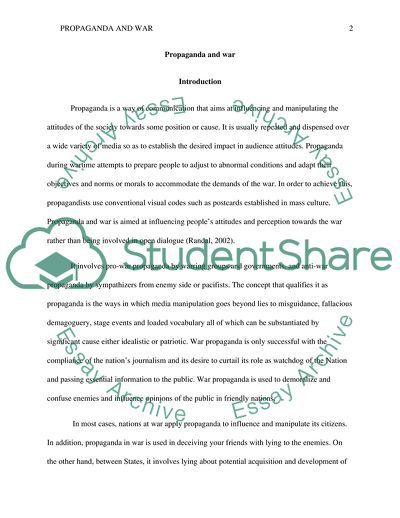Cite this document
(Did the WWI or WWII mark the Pinnacle of the Importance of Wartime Coursework Example | Topics and Well Written Essays - 2000 words - 2, n.d.)
Did the WWI or WWII mark the Pinnacle of the Importance of Wartime Coursework Example | Topics and Well Written Essays - 2000 words - 2. https://studentshare.org/military/1768930-did-the-first-world-war-or-the-second-world-war-mark-the-pinnacle-of-the-importance-of-wartime-propaganda-before-1945
Did the WWI or WWII mark the Pinnacle of the Importance of Wartime Coursework Example | Topics and Well Written Essays - 2000 words - 2. https://studentshare.org/military/1768930-did-the-first-world-war-or-the-second-world-war-mark-the-pinnacle-of-the-importance-of-wartime-propaganda-before-1945
(Did the WWI or WWII Mark the Pinnacle of the Importance of Wartime Coursework Example | Topics and Well Written Essays - 2000 Words - 2)
Did the WWI or WWII Mark the Pinnacle of the Importance of Wartime Coursework Example | Topics and Well Written Essays - 2000 Words - 2. https://studentshare.org/military/1768930-did-the-first-world-war-or-the-second-world-war-mark-the-pinnacle-of-the-importance-of-wartime-propaganda-before-1945.
Did the WWI or WWII Mark the Pinnacle of the Importance of Wartime Coursework Example | Topics and Well Written Essays - 2000 Words - 2. https://studentshare.org/military/1768930-did-the-first-world-war-or-the-second-world-war-mark-the-pinnacle-of-the-importance-of-wartime-propaganda-before-1945.
“Did the WWI or WWII Mark the Pinnacle of the Importance of Wartime Coursework Example | Topics and Well Written Essays - 2000 Words - 2”. https://studentshare.org/military/1768930-did-the-first-world-war-or-the-second-world-war-mark-the-pinnacle-of-the-importance-of-wartime-propaganda-before-1945.


